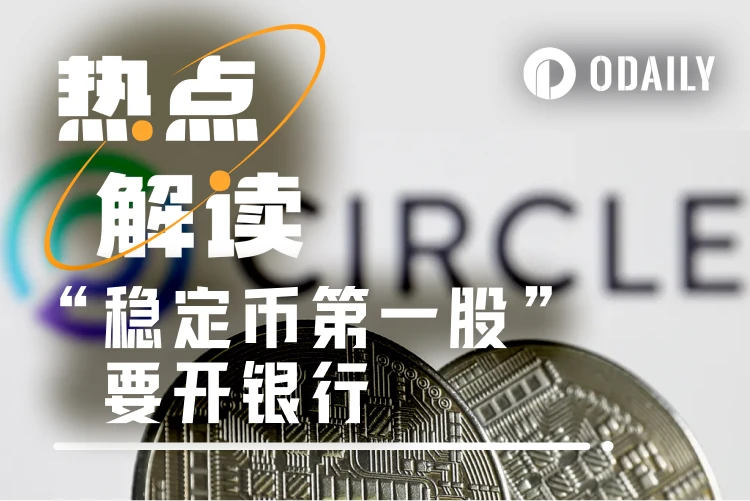Original | Odaily Planet Daily (@OdailyChina)
Author | Ethan (@ethanzhangweb3)_

On June 30, Eastern Time, the issuer of the stablecoin USDC, "the first stock of stablecoins" Circle (CRCL) announced that it has officially submitted an application to the Office of the Comptroller of the Currency (OCC) in the United States to establish a federal trust bank named "First National Digital Currency Bank, N.A."
According to the announcement on Circle's official website, once approved, this bank will become Circle's first federally regulated custodian entity, which will not only allow it to self-manage its over $60 billion in USDC reserve assets but also provide digital asset (especially tokenized bonds and stocks) custody services for institutional clients.
Unlike traditional banks, this license does not allow for cash deposits or loan issuance, making it closer to a "federal trust company" model. Currently, only Anchorage Digital in the U.S. has obtained a similar license, and Circle may become the first holder of a self-custody license in the stablecoin issuance field.
Why apply? Circle's ambition for a "new financial architecture" is gradually taking shape
This is not a short-term business adjustment but a comprehensive strategic advancement by Circle as a "stablecoin infrastructure provider."
The "GENIUS Act," passed in mid-June, is pushing stablecoins into an era of "regulated and compliant transparency," with clear requirements for asset custody isolation, transparent disclosure, and the qualifications of regulatory financial institutions. (For details, see: “Reshaping Global Financial 'Utilities': How the GENIUS Act Ignites Circle and the Stablecoin 'Regulatory Bull Market'?”)
If Circle is granted the federal trust bank license, it will not only bypass traditional bank custody (such as the current stage with BNY Mellon) but also avoid external regulatory blind spots, reclaiming control over core assets and significantly enhancing business resilience.
Rather than saying Circle is applying for a license, it is more accurate to say it is building the future "digital dollar operating system." Whether it is USDC issuance, RWA custody, or payment settlement cooperation with Visa, Stripe, etc., all require the underlying stablecoin infrastructure to possess stronger self-control and compliance attributes.
Circle's move is not just a change in custody rights but also a self-establishment of its position as a "digital dollar on-chain executor."
Market Commentary
After this news was announced, the industry generally believes that Circle's move represents a "deep integration" with U.S. regulation and can even be seen as an important step in the "nationalization of stablecoins."
Crypto investor and forex trader Mr. Man believes that if this license is approved, Circle will act as a federally regulated trust bank, directly connecting to the Federal Reserve's payment system. USDC will be able to flow in and out of the Federal Reserve's financial pipeline like funds from traditional clearinghouses, no longer relying on intermediary banks.
Technical analyst and crypto content creator ALLINCRYPTO stated that once approved, Circle could directly provide digital asset custody for institutions, making it easier for mainstream companies to integrate USDC.
Some institutional investors believe that Circle is far ahead in the compliance race, especially after obtaining EU MiCA authorization and Abu Dhabi MSB principle licensing, the "OCC+GENIUS" system's federal license will open the door to global central bank-level clients.
However, some voices remain cautious. Citigroup analysts stated, "Although the long-term trend is bullish, the business model of stablecoins has not yet been proven, and Circle's current market cap premium is already quite aggressive." According to data from S3 Partners, short positions in Circle have been increasing daily since its listing, and it has become one of the most shorted stocks in the U.S. blockchain sector.
Conclusion: Circle is not trying to be a bank, but to redefine "the bank of the dollar"
What Circle wants to apply for is not a commercial bank as we understand it, but a designer of a new type of digital financial vehicle for the dollar.
It does not engage in lending, does not accept deposits, and does not interfere in the interest rate market, but focuses on the basic services of on-chain dollars, on-chain assets, and on-chain settlements. This is different from Tether's focus on trading; Circle is betting on how stablecoins will be integrated into national, institutional, and even clearing systems in the infrastructure-level battlefield over the next decade. (For details, see: “Circle and Tether may not be competing species; the hierarchical model of stablecoin value realization suggests so”)
IPO is a financing node, licensing is a compliance cornerstone, and whether it can become the "sovereign agent of on-chain dollars" now depends on whether this license is approved.
免责声明:本文章仅代表作者个人观点,不代表本平台的立场和观点。本文章仅供信息分享,不构成对任何人的任何投资建议。用户与作者之间的任何争议,与本平台无关。如网页中刊载的文章或图片涉及侵权,请提供相关的权利证明和身份证明发送邮件到support@aicoin.com,本平台相关工作人员将会进行核查。




